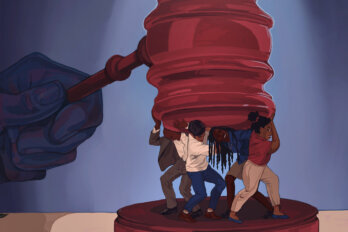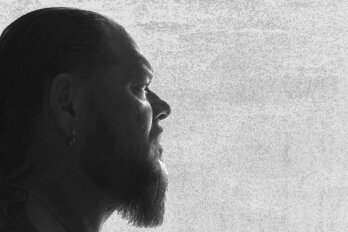This is the fourth instalment in a series about a criminal rape trial that took place in Toronto late last year. The trial lasted eight days; the judge announced his verdict earlier this month.
At the time of the actions that led to the criminal charges, the female accuser was seventeen years old, entering her final year of study at a Toronto high school. The male defendant was a year older, a star athlete on his way to winning a scholarship to a US college. She had substantial credibility problems on the witness stand. His testimony seemed far more convincing—at least at first. But this was more than just a “she said, he said”—or, as it turned out, “she lied, he lied”—case. There was an element of physical evidence against him: bruises on her arms and legs. The judge had to decide if the totality of the prosecutors’ case against the defendant was enough to send him to jail, brand him a sexual offender, and destroy his promising future.
Despite its sensational nature, this was a case that never made headlines. What I observed during my reporting was the farthest thing from a Jian Ghomeshi courthouse scene, with mobs of press and police. I was the sole reporter at the superior court trial and, on most days, the only observer not directly related to the case. The mother and grandmother of the accused, whom I will call Matthew in the reports that follow, attended throughout the trial. The complainant, who will be known as Ava, was supported by a representative from victim services and the detective in charge of her case.
Ava’s family and Matthew’s father were not permitted in the courtroom as they were all considered to be potential witnesses. They spent much of their time in the courthouse hallways, pacing or sitting nervously. Like everyone else, they knew that the events unfolding on the other side of the courtroom door would deeply affect the two young people involved for their entire lives.
—Ann Brocklehurst
As the trial begins its second week, defence attorney Gary Stortini asks Ava about a fake Facebook account that he says she set up in the summer of 2012, shortly after Matthew stood her up at her birthday dinner.
“Did you tell your mother you had the idea to set up a false Facebook account? ” asks the lawyer (remember, he is reminiscent of Matlock).
“No.”
“That your girlfriend had the idea to set up a false Facebook account, get flirtatious with [Matthew] on the account, and invite him [over to a stranger’s house]? ”
“No.”
“You didn’t hide in the bushes waiting to see if he would arrive? ”
“No.”
“You didn’t tell this to your mother? ”
“I didn’t tell my mom anything. It was over, done. I had no reason to communicate with him.”
Stortini drops the subject. He spends the remainder of his cross-examination, which lasts half the morning, on the alleged assault.
Matthew’s lawyer puts an alternative version of events to Ava. The story he tells is one of consensual sex and a girl who couldn’t let go. She wanted to see Matthew in the hopes of getting back together, he suggests.
In her videotaped statement to police, Ava said that Matthew drove her from a subway station to a parking lot where they had never been together, then forcibly confined and raped her.
According to Stortini, however, Matthew drove instead to her house. They parked outside, and Ava asked him over and over again why he hadn’t shown up for her birthday. When they saw her mother open the door to come outside for a cigarette, she suggested they drive to a different parking lot—a place where, Stortini maintains but Ava denies, they’d had sex on two previous occasions. There, she told him he was a great guy, but also an asshole who cared only about sports.
Stortini’s story is that Ava went from angry to friendly and back again several times. She told Matthew she could come visit him at his American boarding school next term, something he replied was impossible. She sat on his lap and kissed him, then left the car. Matthew’s windows were open; he asked if he could drive her home. Ava said no and crossed in front of the vehicle, walking away. Then she turned and said, “Fuck it, it’s summer.”
Stortini continues: Ava got back in the car, removed her shorts and underwear, and climbed into the driver’s seat. Matthew grabbed her by the upper arms and lifted her on top of him—that’s where the bruises on her biceps came from. He reclined his seat and removed his pants. They had passionate sex. Ava’s thighs bruised as Matthew manipulated her in the confined space. When it was over, he said, “I’m done.”
As Stortini unspools this version of events, Ava covers her face with her hands. She cries “Nooooo,” stretching the word out. She says again and again and again that none of these things happened, that she was tired, that she just wanted to go home.
But Stortini isn’t finished. He says that when Matthew drove Ava home, she was upset in the car, and refused to look at or talk to him. He has a theory of what happened after his client drove off. First, Ava shared a cigarette with her mother. While they were smoking, her mother asked her why the buttons on her blouse were undone, and what was she doing with the guy who’d stood her up on her birthday. Ava fled inside to take a bath. Her mother heard her crying, and entered the bathroom to find out why. When she noticed her daughter’s bruises, she demanded an explanation.
“That’s when you became hysterical,” Stortini says to Ava. “Did you know [your mother] was texting [Matthew]? ”
“She grabbed the phone. I didn’t know what she was doing,” Ava answers.
A few minutes later, the cross-examination ends. After four days on the witness stand, the complainant’s testimony is over. She leaves the courtroom.
*
Ava’s friend Zoe (not her real name) is the next witness. Her blonde hair is pulled back in a tight ponytail. She’s dressed in a black hoodie with the name of a university displayed across the front in big red letters, black leggings, and Doc Martens boots. She looks slightly nervous, but also a bit excited to be in court.
Zoe and Ava haven’t spoken to each other since the night of the alleged rape. Stortini goes over their alcohol consumption from that evening: they’d shared a mickey of rum as they made their way downtown to a concert. He asks Zoe if Ava was drunk.
“She didn’t seem intoxicated.”
“Did her behaviour change? ”
“I don’t believe so. She didn’t seem drunk to me.”
Zoe says the reason why she fought with Ava was because Ava and another friend both thought Zoe was drunk.
“What was her demeanour? ” Stortini asks.
“She seemed alright,” Zoe answers.
“Was she upset? ”
“Yes, quite upset.”
Stortini asks about Ava and Matthew’s relationship.
“It was obvious [Ava] liked him? ”
“I believe she liked him.”
“Does she swing back and forth in her moods? ”
“No, I don’t think so.”
“Did you know before your fight that [Ava] had contact with [Matthew] earlier in the day? ”
“I don’t think so.”
“You didn’t think they were [still] dating? ”
“No.”
Stortini moves on to the Facebook incident, which he had questioned Ava about earlier this morning. He asks Zoe if she helped Ava set up a fake account for a non-existent girl, which Ava used to flirt with Matthew as a test of character.
Zoe answers yes, she did.
“It was her idea,” says the witness. “It wasn’t mine.”
“Was it your house [Ava invited him to]? ”
“No, around the block.”
“You two hid in the bushes? ”
“Yes,” replies Zoe, somewhat sheepishly.
“You watched him go to the door? ”
“Yes.”
“After he missed [Ava’s] birthday, were they through? ”
“I’m not sure.”
Stortini asks if Ava was upset when Matthew showed up at that house.
“Yes.”
“Was it obvious she liked him more than he liked her? ”
“No.”
Stortini has Zoe clarify a few more details about the fake Facebook-ing: the girls didn’t know who lived at the address they provided to Matthew; he’d been invited there to join the non-girl in her hot tub; no one was home when he showed up. The whole thing ended with him returning to his car, not much the wiser as to what had happened.
*
The prosecution’s next two witnesses are Ava’s father and the police constable who was called to her home after the alleged assault. Both confirm that she was extremely agitated and crying hysterically. Their testimonies are brief.
Ava’s mother, a wiry, forceful woman in her fifties whom I will call Mary (not her real name), is the Crown’s final witness. As assistant Crown attorney Sharna Reid begins questioning her, there is some legal wrangling about “prior consistent statements.” Ontario Superior Court Justice Gary Trotter must determine exactly what Mary can and cannot say in her testimony.
The main point of contention is an anecdote that Ava tried to bring up, more than once, during her time on the stand. It’s about something Matthew did when she invited him to eat dinner with her family; he allegedly told a story about how he and his buddies at school wanted to videotape a fifteen-year-old girl having sex in her dorm room. Mary, apparently, overheard this.
Waiting on the stand, she doesn’t hide her disdain for what she believes is the legalistic hair splitting that might see this information deemed inadmissible.
“I’m sorry you’re not happy with my rulings,” Trotter says to her. He calls a brief recess, and asks Reid to make clear to the witness what is off the table for discussion.
But when the proceedings resume, Mary returns quickly to the anecdote. She says Matthew’s story led her to suspect him of “sexual deviancy.”
“He made us nervous,” she explains. “[Ava]’s sister was disgusted. I told [Ava], ‘You deserve better.’”
In exasperation, Justice Trotter calls an end to the day’s proceedings.
*
By the following morning, the judge has done some legal reading. As Mary’s testimony resumes, he allows her more leeway in what she can talk about.
The Crown puts a few last questions to the witness, asking if she was angry with her daughter for taking a lift home from the subway with Matthew.
“I may have been upset with her for taking a drive with this kid . . . I have a recollection of asking her why she would take a ride with him and not wait for someone else.”
Carolyne Kerr, Stortini’s co-counsel, handles the defence’s cross-examination. She asks why, if Mary had been so upset about Matthew’s table talk, she hadn’t mentioned it in her police statement.
“I answered questions I was asked,” Ava’s mother replies. “I was more concerned about my daughter . . . I hadn’t slept in thirty hours.”
Kerr tells Mary that she provided a forty-five-page statement, in which she gave many long and involved answers, and went on at length about her cellphone dying.
“Detective Wookey didn’t question you in a manner that forced you to give one-word answers. You did tell Detective Wookey a bit about [Matthew]. On page five, you say, ‘I had met the boy a number of times. He had dated my daughter a number of times. He was a normal kid with a future, for what I knew.’”
Next, Kerr asks about the birthday dinner no-show. Mary replies that it was her understanding that Ava and Matthew had broken up before that, because Ava’s friends had told her that he was running around with other girls.
“Your daughter told you about a fake Facebook account.”
“It was an idea of a girlfriend to test his character.”
“Your daughter told you he did show up [at the fake girl’s house].”
“Yes. I don’t believe it was Ava’s idea . . . I thought it was ridiculous, at that age, to be engaging in such covert ideas.”
“You told her she deserved better in her actual choice of boyfriends? ”
“[Her sister] was more upset, more vocal. My line was, ‘You deserve better.’ My line was, ‘Just let it go.’ It seemed to me it was going to become unhealthy.”
[on-trial]



